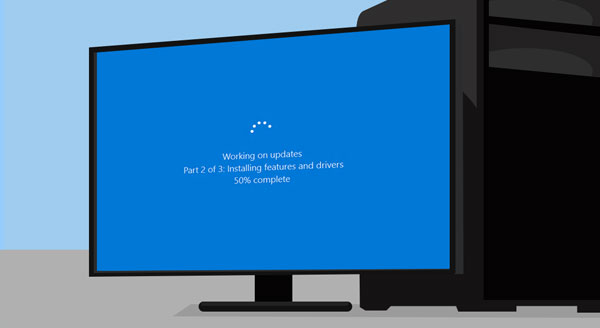Stories about hackers and virus attacks seem to be making the news almost every day, and many of these news stories include tips on how you can avoid becoming a victim. One common theme among these tips is ensuring your Windows operating system has all available updates applied.
Every day hackers are trying to figure out new ways to break into Microsoft Windows and once they do find a weakness, they try and find a way to spread it. This could be through a malicious email attachment or even something that spreads without your involvement.
Updates Explained
Whenever Microsoft discovers a potential flaw, they push out a small piece of software to all Windows computers running a supported version. If set correctly, your computer will check if there’s any updates or patches and install them automatically. In new versions, this usually happens when you’re shutting down or starting up, and doesn’t impact your experience at all. Unfortunately, some users will manually disable or delay their updates, creating a risky situation.
The update may include security patches, drivers or a simple tweak to address bugs or issues with Windows. Sometimes, they even include new features or applications to improve the stability of your operating system. They’re a good thing!
Not All Versions Get Updates
Some older operating systems are no longer supported, which means unless there are extenuating circumstances, Microsoft won’t issue any new updates. Not a single one – generally, if cyber criminals discover a flaw after support ends, they’re free to exploit it. For example, Windows Vista support ended in early 2017, and Windows 7 ended in January 2020. The moment an operating system is retired it becomes a playground for cyber-criminals.
It’s not just Microsoft walking away from these old versions either. Third party software like the Google Chrome browser will still work, but they’ve also stopped supporting old versions with crucial updates and patches. It might seem like everything is working fine because your anti-virus isn’t pinging in alarm, but it just becomes a case of risk, upon risk, upon risk.
What to do with older Windows
As much as you’re comfortable with your older version of Windows, each time you boot up you’re exposing your system, important files and entire network. It only takes one weak entry point in the chain to allow malware into all connected devices. That could mean your photo storage, media centre or even smart appliances.
It’s not worth it – if you’re running Windows 7 or Vista (or older), you need to update to a more modern operating system ASAP. This may seem like an easy task however there a few things to take into consideration when doing an upgrade. Usually this would be fairly straight forward although there may be incompatibilities with some software or applications which will also need upgrading or the hardware you are running may also not be suitable for the upgrade.
For the most part, it is always best to get expert advise whenever upgrading any of your IT infrastructure for the peace of mind in knowing the solution will not only have those critical updates, but will also work they way you want it to.
We can also monitor your system remotely and apply your Windows updates with our Managed Services packages, ensuring you are always up to date and protected. Give us a call on 02 4326 0655 to discuss.

